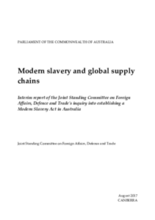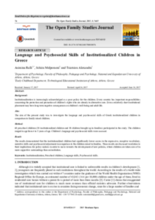Displaying 821 - 830 of 1510
This article explores the perspectives and programme needs of transition service providers (institutions and the government) in preparing and supporting adolescent girls leaving institutional care in Harare, Zimbabwe.
This interim report from the Parliament of Australia's Joint Standing Committee on Foreign Affairs, Defence and Trade presents its recommendations on the adoption of a Modern Slavery Act in Australia, with consideration to the trafficking, forced labor and child exploitation through orphanage tourism.
This report presents the findings from a secondary analysis of data from a comprehensive intervention in three baby homes in St. Petersburg, Russian Federation. The analysis examined whether caregiver-child interaction quality, number of caregiver transitions, and group size mediated the impact of intervention on children's attachment behaviors and physical growth.
This paper presents the findings from a population-based, multi-stage random cluster knowledge, attitudes, and practices (KAP) survey of child caregivers in Liberia, revealing the primary reasons for parent-child separation and common misconceptions about alternative care.
This study investigated the language and psychosocial skills of pre-school aged Greek institutionalized children in comparison to Greek children of the same age raised in a family environment.
All over the world, children are placed in orphanages because their families do not have the resources to care for them. In this short film, a mother makes the difficult decision to leave her daughter to the care of an orphanage.
This study consulted with young people in Australia about their perspectives on what makes residential care safe and how safety could be improved within residential care.
This study investigated the incidence of maltreatment experienced by children living outside parental care, comparing the prevalence of abuse between children living with extended family, children living in institutional care, and children living or working on the street.
This chapter of Child Maltreatment in Residential Care provides a background on the development of the child welfare system in Turkey, focused on the transition from institutional care toward family-based care and higher standards for institutions.
This report summarizes the findings from various studies investigating child sexual abuse within institutional care throughout Austria, Germany, and Switzerland and offers suggestions for future research and intervention.


